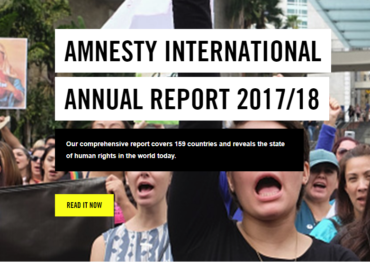 A new Amnesty International Report says Tibetans continued to face discrimination and restrictions on their rights to freedom of religion and belief, of opinion and expression, of peaceful assembly and of association.
A new Amnesty International Report says Tibetans continued to face discrimination and restrictions on their rights to freedom of religion and belief, of opinion and expression, of peaceful assembly and of association.
The Amnesty International Report 2017/18, released on February 22, 2018, documents the state of the world’s human rights in 159 countries and territories during 2017. The report said, “Tashi Wangchuk, a Tibetan education advocate, remained in detention awaiting trial at the end of the year, without access to his family.”
The report said that the Chinese Government “continued to draft and enact new laws under the guise of “national security” that presented serious threats to human rights.” It continued, “Activists and human rights defenders were detained, prosecuted and sentenced on the basis of vague and overbroad charges such as “subverting state power” and “picking quarrels and provoking trouble”. Controls on the internet were strengthened. Repression of religious activities outside state-sanctioned churches increased.”
Referring to the Tibetan issue, the report said, “Repression conducted under “anti-separatism” or “counterterrorism” campaigns remained particularly severe in the Xinjiang Uighur Autonomous Region and Tibetan-populated areas.”
Following is the full text of the Tibet section in the report.
TIBET AUTONOMOUS REGION AND TIBETAN-POPULATED AREAS IN OTHER PROVINCES
ECONOMIC, SOCIAL AND CULTURAL RIGHTS
In June, in his report of a 2016 visit to China, the UN Special Rapporteur on extreme poverty and human rights stated that while achievements towards alleviating poverty were generally “impressive”, the situation of Tibetans and Uighurs was deeply problematic, and “that most ethnic minorities in China are exposed to serious human rights challenges, including significantly higher poverty rates, ethnic discrimination and forced relocation”.
Tashi Wangchuk, a Tibetan education advocate, remained in detention awaiting trial at the end of the year, without access to his family. He was taken away in early 2016 for giving an interview to the New York Times in which he expressed fears about the gradual extinction of the Tibetan language and culture.
FREEDOM OF EXPRESSION
Ethnic Tibetans continued to face discrimination and restrictions on their rights to freedom of religion and belief, of opinion and expression, of peaceful assembly and of association.
At least six people set themselves on fire in Tibetan-populated areas during the year in protest against repressive policies, bringing the known number of self-immolations since February 2009 to 152.
On 18 March, Pema Gyaltsen set himself on fire in Ganzi (Tibetan: Kardze) Tibetan Autonomous Prefecture in Sichuan Province. Tibetan sources said that he was believed to be alive when he was taken away by the police. His relatives were detained and beaten when they approached the authorities asking for his whereabouts. Tibetan NGOs abroad said that Lobsang Kunchok, a Tibetan monk detained after surviving a self-immolation attempt in 2011, was released from prison in March 8.
On 26 December, Tibetan filmmaker Dhondup Wangchen was reunited with his family in the USA, almost 10 years after he was first detained in China for making an independent documentary about the views of ordinary Tibetans ahead of the 2008 Beijing Olympics.

